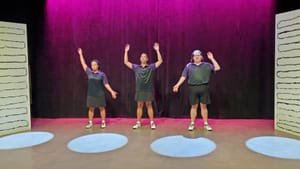Stay in the Loop
BSR publishes on a weekly schedule, with an email newsletter every Wednesday and Thursday morning. There’s no paywall, and subscribing is always free.
Labor on stage: two different visions of work
Philly Fringe 2024: Hum’n’Bards presents The Boy Bands Have Won and Thomas Choinacky presents Forehand Down the Line

This year’s Philly Fringe Festival presented two distinct explorations of performance art made in queer community: the Hum’n’Bards Theater Troupe’s The Boy Bands Have Won and Thomas Choinacky’s Forehand Down the Line. Both works (which ran September 6-8, 2024, in different venues) delve into themes of labor and visibility, though they approach these concepts with different aesthetic commitments.
The Boy Bands Have Won
The Boy Bands Have Won continued the Hum’n’Bards tradition of full-album theatrical adaptations, this time honoring British punk band Chumbawamba’s politically charged 2008 album (of “Tubthumping” fame). Despite the troupe's ambitious attempt to depict the struggles of working-class individuals through a series of songs set in various flats, the execution fell short.
The narrative was conceptually unclear, with the episodic nature of the songs failing to coalesce into a cohesive story. Character development felt superficial, leaving the audience with fragmented glimpses into the lives depicted. While the strength of the production lies in Chumbawamba's music, the execution fell short. The performances by Maxine Webber, Shreya Ragavan, and Taylor Cawley were uneven, though director and lead artist Travis Rosemarie Curhart-Fischbach provided solid musical backing.
Theater in the Covid era
The setting at Rosy’s Taco Bar East’s deep stage, plus the simplistic choreography, often left the performers lost in the background. The show occasionally broke the fourth wall, with interactions designed to engage the audience and encourage a party-like atmosphere. However, these moments were somewhat undermined by a stringent mask policy, which, while essential for safety, detracted from the intended lively, immersive atmosphere.
The lingering impact of The Boy Bands Have Won is a reflection on the complex legacy of theater during the COVID era. With one performer masked throughout, the emotional range felt restricted, highlighting the difficult balance between presenting accessible art and ensuring performer safety. This dynamic stirred a personal reflection on privilege and the potential lighter tone the show might have had without such constraints.
Forehand Down the Line
In contrast, Thomas Choinacky’s Forehand Down the Line offered a sophisticated meditation on the role of the tennis ball person through dance. This 50-minute piece used the precise language and movement of tennis to explore themes of visibility and labor.
Choinacky’s choreography stood out for its precision and variety. The work masterfully employed the specialized grammar of tennis, allowing the movements of the trio of dancers—Malik Ever, Eliana Fabiyi, and Justin Jain—to construct detailed and engaging characters. Despite the minimal dialogue, the performers conveyed the complexities and competitive dynamics of their roles with compelling depth.
The choreography itself was both meticulous and dynamic. Choinacky expertly balances humor, shifts in tempo, and unexpected elements to keep the audience engrossed. The set, composed of paintings made with tennis balls, complements the performance beautifully, representing what the production notes describe as “a meditative practice following a single, rolling stroke documenting internal movements of the body into (a)symmetrical spatial patterns.”
Exploring performance and presence
A notable aspect of the production was Choinacky’s commitment to visibility, which became particularly evident during the run. When performers AZ Espinoza and Shizu Homma had to exit due to illness and injury, Choinacky chose not to restage the piece. Instead, the performance continued with spotlighting left empty, a powerful and brave decision that highlighted the absent performers and underscored the piece’s themes of invisible labor.
This choice added a layer of emotional weight to the production, emphasizing the significance of the roles portrayed and the impact of their absence. The empty moments on stage resonated deeply, making the work not only a reflection on the ball person's experience but also a poignant statement on the nature of performance and presence.
While The Boy Bands Have Won struggled with conceptual clarity and execution, Forehand Down the Line succeeded in delivering a thought-provoking and emotionally resonant exploration of labor through dance. The Philly Fringe is a perfect time to see something outside the scope of the usual theater scene, and both of these shows certainly delivered that.
What, When, Where
The Boy Bands Have Won. Created by Hum’n’Bards Theatre Troupe, directed by Travis Rosemarie Curhart-Fischbach. September 6-8, 2024, at Rosy’s Taco Bar East, 624 S 6th St, Philadelphia. (215) 413-1318 or phillyfringe.org.
Forehand Down the Line. Created and choreographed by Thomas Choinacky. September 6-8, 2024 at the Arden’s Studio Theatre at Hamilton Family Art Center, 62 N 2nd Street, Philadelphia. (215) 413-1318, phillyfringe.org, or thomaschoinacky.com.
Sign up for our newsletter
All of the week's new articles, all in one place. Sign up for the free weekly BSR newsletters, and don't miss a conversation.

 Josh Herren
Josh Herren